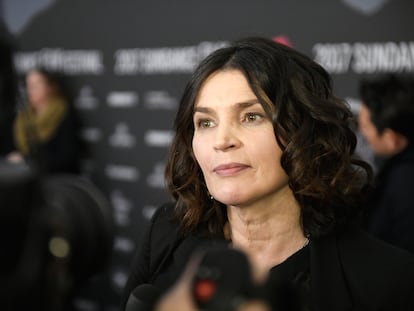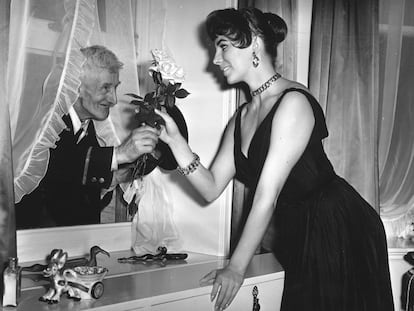Paz de la Huerta, Harvey Weinstein victim: ‘There are many girls who continue to be exploited in Hollywood’
The performer shows her paintings for the first time in the Parisian Ruttkowski; 68 Gallery. ‘My therapist showed me that art can heal me,’ she says
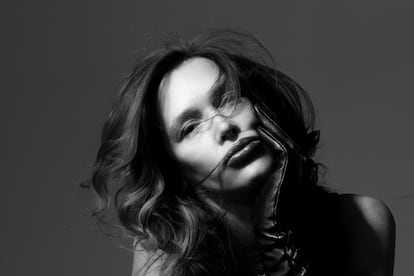

Paz de la Huerta, 39, is showing some of her paintings in contemporary art gallery Ruttkowski; 68, in the Parisian neighborhood of Le Marais. It’s the first time exhibiting her art for the cult actress and underground icon, who has been a muse for directors like Jim Jarmusch and Martin Scorsese. She was also one of the women who in 2017 called out the sexual abuse of producer Harvey Weinstein. The group show she’s participating in until the end of February is a preview of a solo show that will open this summer in the same gallery. Her canvases, impregnated with surrealism and religious themes, are influenced by artists like Francesco Clemente, who she calls “a friend and teacher”, and Jean-Michel Basquiat, who went to the same New York high school that she did, Saint Ann’s in Brooklyn Heights.
“I’ve painted since I was a child. But it was my therapist, Michael Rebel, who encouraged me to do it as a form of therapy. He taught me that art could heal me,” explains the actress in a videocall with EL PAÍS. “Since I was a child, I have gone to many psychologists, who have tried to make me understand the real relationship I have with my parents, but it was so crazy that I didn’t want to accept it. Somehow, I have expressed it through painting.”
Known for her roles in films like The Limits of Control and Enter the Void, and the television series Boardwalk Empire, De la Huerta says that her work speaks of her life: of the abuses that she says she suffered at the hands of her family. Also, of her constant flight from her parents, whom she accuses, among other things, of harassment and attempts to have her committed to a mental health facility. In one of her paintings, entitled Oh, Father, she portrays herself as a child with a black eye, next to a menacing father figure. In another, How I Replaced Every Memory Of My Evil Mother With The Virgin Mary, she imagines herself as a baby, mutilated by her own parent.
“My art is my way of seeing things clearly. I’ve had a lot of drama in my life, and for a long time I was keeping it in my subconscious. How I Replaced Every Memory Of My Evil Mother was the way I found to heal myself of the hurt that my mother caused me. Through therapy and painting, I have replaced every memory I have of her with the Virgin Mary,” she says.
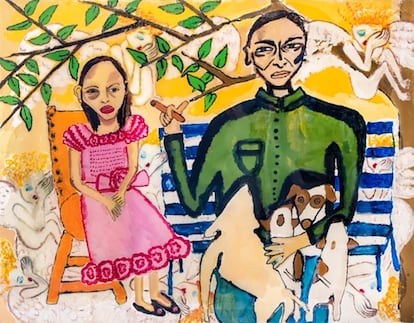
The actress’ paintings are full of mystic and supernatural references: angels who cry, virgins and celestial beings … “I’m very much a believer. I am Catholic. My faith in Jesus has saved me. Because of that, my art is very biblical,” she recognizes. She also practices the Yoruba faith, an African belief system that is derived from Cuban Santería and Brazilian Candomblé. She says she believes the orishas, spirits sent by the “supreme being” to “show us the road.” In another one of her works, The Fairy Forest, a group of children play in the woods under the attentive gaze of angels, or divine beings. She recalls that she painted it during a stay at the Mount Madonna yoga and meditation center in California, where, according to her, she hid for a time from her family. “I don’t want to say where I live now. It’s a darling place, surrounded by animals and with fantastic friends. But if I say where it is, they’ll come for me,” she says. “Who?” “My parents,” she responds.
The actress says she’s been hiding for two years from her parents, the Spanish aristocrat Ricardo Ignacio de la Huerta, Duke of Mandas y Villanueva, Grandee of Spain, and her mother, U.S. activist Judith Bruce, a well-known voice in the fight against child marriage and violence against girls. She has filed a complaint against them for sexual abuse, a process that, as her Spanish lawyer explained to EL PAÍS, is currently in preliminary proceedings. The complaint was filed in the Talavera district courts and, after appeal, has been reopened by the Toledo provincial court. “Paz has already testified, her parents have testified and we are waiting for the court to agree on the testimony of a witness, after having requested it,” says the actress legal representative, Esther Romero Simón of the firm Le Morne Abogados. Her team also requested a protective restraining order against De la Huerta’s parents, which was rejected.
“The aristocracy thinks that it’s powerful, but I know the whole truth about them. I don’t care about spending all the money I have on lawyers and applying for restraining orders in Spain, France, United States or wherever else. I’m not going to stop until I get it,” says the actress. She states that, after years of therapy, she’s arrived at the conclusion that her parents were also the ones who put her in touch with Weinstein, the powerful Hollywood producer who she accused of rape in 2017.
Last April, her family denied having been involved in any kind of abuse against her, or having “sold” her to Weinstein. “I have had no involvement of any kind in the sexual abuse that, in her case, my daughter may have suffered. As a father, I can only deeply regret that this could have happened to a daughter of mine,” said the Duke of Mandas in a letter addressed to the newspaper ABC. “It is false that at the age of 13 (or at any other age) we sold her to Weinstein (or anyone else). In fact, I have never met Weinstein,” said Bruce, who has worked with United Nations groups on strategies for ending discrimination and violence against girls.
Question. Does one of your paintings reflect what you’ve suffered in Hollywood?
Answer. Are you referring to Wein? No, I have never painted Weinstein.
Q. You were one of the actresses who accused the producer. Have you felt penalized by the movie industry?
A. I feel like there’s a lot of hypocrisy, above all among women. There are women who call themselves feminists and then don’t behave well towards other women. My mother is an example.
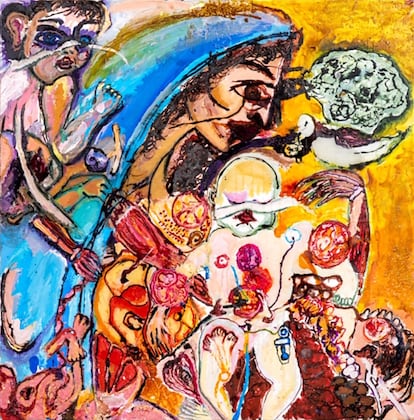
Q. Last year, Weinstein, who is already serving a 23-year sentence in prison on rape and sexual assault charges, was sentenced to another 16 years for the same crimes. How did you react to the news?
A. l was angry that I couldn’t testify in the case. I blame my family for that. I haven’t given up on justice, but honestly, I’m trying to focus my energy on art. Justice cannot be trusted, but art is allowing me to regain my voice. I hope my story helps other victims. There are many girls who continue to be exploited in Hollywood, who continued to fall into drugs or spiral into self-destruction. I could have ended up dead or in an asylum, but I ran away from it all and I have survived.
Q. Can someone like Weinstein be forgiven?
A. It’s easier for me to pardon a man like him, who did what he did, than a woman. I don’t want anyone to misinterpret me or think that I’m justifying what he did. I am not justifying it. But when I was a young girl, I looked for and needed my mother to protect me. Many of the people who harmed me were women who are looked at as saints or activists, women who I ran to as sisters and they hurt me. The hypocrisy angers me more than anything else. Weinstein didn’t pretend to be a good man. Neither did my father.
De la Huerta was just 14 years old when she first came into contact with Weinstein, who was the co-founder, along with his brother Bob, of the production company Miramax. She met him shooting Lasse Hallström’s The Cider House Rules in 1999. At that time, the producer had already triumphed with such box-office and critically acclaimed hits as Dogma and Shakespeare in Love. Eleven years later, in 2010, according to her testimony, the Hollywood magnate raped her on two occasions a month apart. In 2017, during the popularization of the #MeToo movement, she publicly denounced him, joining a long list of other victims.
The New York police and the city’s then-mayor Bill de Blasio called her claims “highly credible” although her testimony was not included in the case. The Manhattan district attorney did not file charges. In 2018, the performer filed a lawsuit against Weinstein in Los Angeles superior court, alleging that the trauma had driven her to drink and emotionally wrecked her. In 2021, she and 40 other actresses and former Miramax employees signed a settlement agreement with the producer’s lawyers to end the civil lawsuits. According to The New York Times, the collective financial settlement amounted to about $17 million and offered different levels of payment to the victims depending on whether they wanted to release Weinstein from future lawsuits.
“Would I have liked to testify against Weinstein? Of course,” says the actress, who does not regret signing the agreement. “The money has allowed me to be free. If it hadn’t, I would be dead or in a mental hospital and no one would know my story.” Now, she’s writing a memoir with U.S. journalist Sam Kashner, a Vanity Fair contributor and expert on the Hollywood star system.
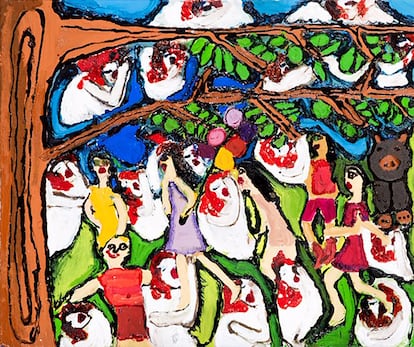
Q. Would you ever work in Hollywood again?
A. Of course. I love making movies. I have a project in the works with Tony Kaye. And I would love to work with Pedro Almodóvar.
Q. Is Hollywood still an unsafe place for women?
A. Less than it was before. Now, after everything that has happened, men in the industry have more fear. Hollywood is a less dangerous place that when I began.
Sign up for our weekly newsletter to get more English-language news coverage from EL PAÍS USA Edition
